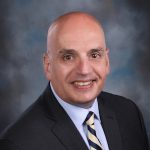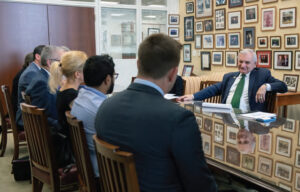

Explore This Issue
ACEP Now: Vol 42 – No 06 – June 2023Sen. Maggie Hasan provides an update on mental health legislation during LAC23.
ACEP’s Annual Leadership & Advocacy Conference (LAC) was held April 30–May 2 in Washington, D.C. With Congressional offices finally back open for in-person meetings, more than 450 emergency physicians from 42 states were back in force in the nation’s Capitol to advocate for emergency physicians.
There was a palpable energy and great vibe to the whole meeting, which was literally standing room only for almost every session! Let’s be honest, being together matters. Given all of the challenges that we are facing in the ED, being able to share those experiences, and how we are feeling is really important. This LAC was a particularly empowering meeting, reminding us that we are not alone in fighting to improve for the things that make our professional lives and patient care better.
The Emergency Medicine Residency Association (EMRA) and ACEP’s Young Physicians Section hosted their annual pre-conference Health Policy Primer, an event geared toward EM physicians who are new to policy and advocacy. They tried a new interactive format for 2023. After hearing about different aspects of the U.S. health care system from Drop the Mic presenters, attendees broke into small groups for an interactive design-thinking challenge to build an ideal health care system from scratch. A panel of experts discussed the pros and cons of each proposed system with the audience. It’s amazing how much energy and passion this half-day Policy Primer brings to the conference.

Attendees at the EMRA/YPS Health Policy Primer brainstorm ideal health care models in small groups. (Click to enlarge.)
This year’s Sunday program also included a meeting of the ACEP Council Steering Committee, a special Chapter Leaders Session, a meeting of the ACEP Board of Directors and a “wicked awesome” half-day conference entitled “Power Up: Women in Emergency Medicine Leadership” which was presented by ACEPs American Association of Women in Emergency Medicine (AAWEP).
In a keynote address to a packed room at ACEP’s DC headquarters, Dr. Dara Kass discussed her role with the Department of Health and Human Services and spoke to the passion and purpose she has gained from more than 20 years of serving on the front lines.

Panelists (L-R) Dorothea Lindquist, JD, Skye Perryman, JD, and Diana Nordlund, MD, JD, discuss the legal climate of Dobbs vs. EMTALA. (Click to enlarge.)
“Education and engagement are the key first steps to making everything work better in emergency medicine,” Dr. Kass noted. “Things in emergency departments are challenging today. We need to do more for ourselves and our patients—if not us, then who?”
Monday’s lineup featured presentations and discussions that were all about empowering individual emergency physicians to own their future. Powerful talks on “Influencing Your Workplace from Within” and “Policy Leadership: Opportunities for Emergency Physicians to Govern” provided insights into opportunities for emergency physicians to advocate and lead for the changes needed to improve our practices and the healthcare system.

Tony Cirillo, MD, FACEP, and Ugo Ezenknwele, MD, FACEP, share a laugh between legislative meetings. (Click to enlarge.)
As one of the panelists for the “Opportunities to Govern” session, Brendan G. Carr said the creative mindset of an EM physician is an asset in government, as well. “There is enormous opportunity to take the ideas that exist within emergency medicine— the way that we think about health care delivery and our role in the health care delivery system—and bring that strategy to the government and carve out for them what it ought to look like. There’s hunger for it.”
Breakout lunch sessions included three interactive panel discussions: “Beyond the Burnout: It’s Not Just You,” “Shaping the Future, Confronting the Past: Fostering the Next Generation of Health Equity Leaders,” and a training session for ACEP’s new “Advocacy Leaders” group.

EM physicians caught up with old friends during the NEMPAC VIP Reception hosted at Top of the Hay. (Click to enlarge.)
Not to be outdone, the afternoon sessions were just as powerful, including presentations on “The Workforce of Emergency Medicine: Update and Next Steps,” “Dobbs v. EMTALA – Emergency Medicine after Roe,” “The State of Advocacy: EM Success Stories from State Legislatures,” and Advocacy Breakout Sessions on “Scope of Practice Update and Tools You Can Use,” “Advanced Advocacy: Influencing from Home” and “How ACEP Advocacy has Turned into Laws.”
One of the most impactful presentations was “What Determines Your Paycheck (and How it Can be Influenced).” This presentation by Drs. Jordan Celeste, Nicholas Cozzi, and Jay Mullen provided an easily understandable breakdown of the very complicated system of emergency medicine practice economics and reimbursement. By truly understanding the current realities of reimbursement for ED care, emergency physicians are better equipped to advocate for themselves and for changes to the health care system. (After LAC23, Dr. Celeste wrote a guest blog explaining some of the key points from her session that you can read at acep.org/regsandeggs.)

ACEP President-elect Aisha Terry, MD, FACEP, moderates a panel discussion about opportunities for EM physicians to govern with Miriam A. Bukhsh, MD, Brendan G. Carr, MD, MS, and Alister F. Martin, MD, MPP.
The keynote topic for the afternoon was a “Mental Health Update: What Policymakers Can Do Next.” Sen. Maggie Hassan (D-NH) shared her very clear understanding of the many challenges being faced by emergency physicians today. Sen. Hassan is a passionate advocate for improving the care of patients with mental illness and improving the mental health and wellness of the emergency physicians who provide that care. As she touched on the issues of crowding/boarding, ED violence, and workforce shortages, she acknowledged and validated how difficult it is to be a practicing emergency physician.

ACEP’s Senior Vice President for Advocacy and Practice Affairs Laura Wooster moderates a panel discussion about ED boarding advocacy efforts with Nathaniel Schlicher, MD, JD, MBA, FACEP, and Daniel Freess, MD, FACEP. (Click to enlarge.)
“I know this is a really tough time,” Sen. Hassan said. “But the more you all speak up about who you are and why you do what you do—and what a difference it makes in the lives of your patients and your communities—the faster we are going to be able to get our handle around the systemic challenges that we all need know we need to address. I can’t tell you how effective you are and how much I appreciate the fact that you take the time to advocate and do what you do.”
Tuesday’s programming provided attendees with an update on the key federal legislative and regulatory issues facing emergency medicine and prepped them for Capitol Hill meetings. As with every LAC, the College developed a set of priority issues and talking points for the Capitol Hill visits (emergencyphysicians.org/issues).
The issues that ACEP brings to Capitol Hill and our “asks” are directly geared toward active bills or other actions that we need members of Congress to support. Each of the meetings held with legislators or their staff help remind them that we share a common bond. The patients we care for back home in their district are their constituents, and together we have a shared responsibility to those people to ensure that there is a viable emergency care system.
This year, our visits focused on improving the ED environment and financial stability of emergency physician practice. We asked members of Congress to:
- Sign the bipartisan “Dear Colleague” letter urging the Biden Administration to convene an ED boarding task force.
- Cosponsor the “Improving Mental Health Access from the Emergency Department Act.”
- Cosponsor the “Workplace Violence Prevention for Health Care and Social Service Workers Act” and the “SAVE Act.”
- Cosponsor the bipartisan “Strengthening Medicare for Patients and Providers Act,” which has been introduced by four physician members of Congress: Raul Ruiz, MD, Larry Buschon, MD, Ami Bera, MD, and Mariannette Miller-Meeks, MD. This bill would mandate an inflation-based increase in Medicare reimbursement for physicians every year.
Each year, those of us who attend LAC get to tell our stories. We also understand that we represent emergency physicians across the country and try to tell your stories, too. For many of us, being on duty in the emergency department can feel like an isolating experience that makes it hard to remember we are part of a larger community. Coming to LAC changes that. There is an incredible power in sharing our personal experiences and bringing our collective voices together on Capitol Hill to advocate for our fellow physicians, our patients, and our specialty.
So, come next year to LAC and bring your voice to the meeting! In the meantime, join ACEP’s 911 Grassroots Network to stay updated and informed on federal and state issues. You can also support emergency medicine by contributing to the National Emergency Medicine Political Action Committee (NEMPAC) at. There’s one more easy way to help the cause: Go to ACEP’s Advocacy Action Center to quickly send letters to your legislators asking for their support for the aforementioned bills.
 Dr. Cirillo is Chair of ACEP’s Board of Directors.
Dr. Cirillo is Chair of ACEP’s Board of Directors.


 Dr. Ayorinde (@doc_mcbuckets) is a PGY-2 emergency medicine resident at Johns Hopkins in Baltimore, MD.
Dr. Ayorinde (@doc_mcbuckets) is a PGY-2 emergency medicine resident at Johns Hopkins in Baltimore, MD.



No Responses to “ACEP’s Leadership & Advocacy Conference Reminds Us We Aren’t Alone”